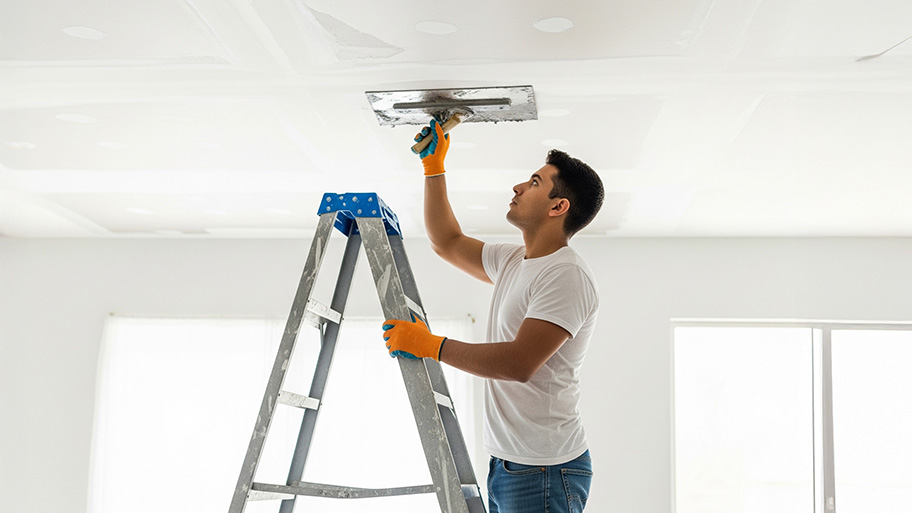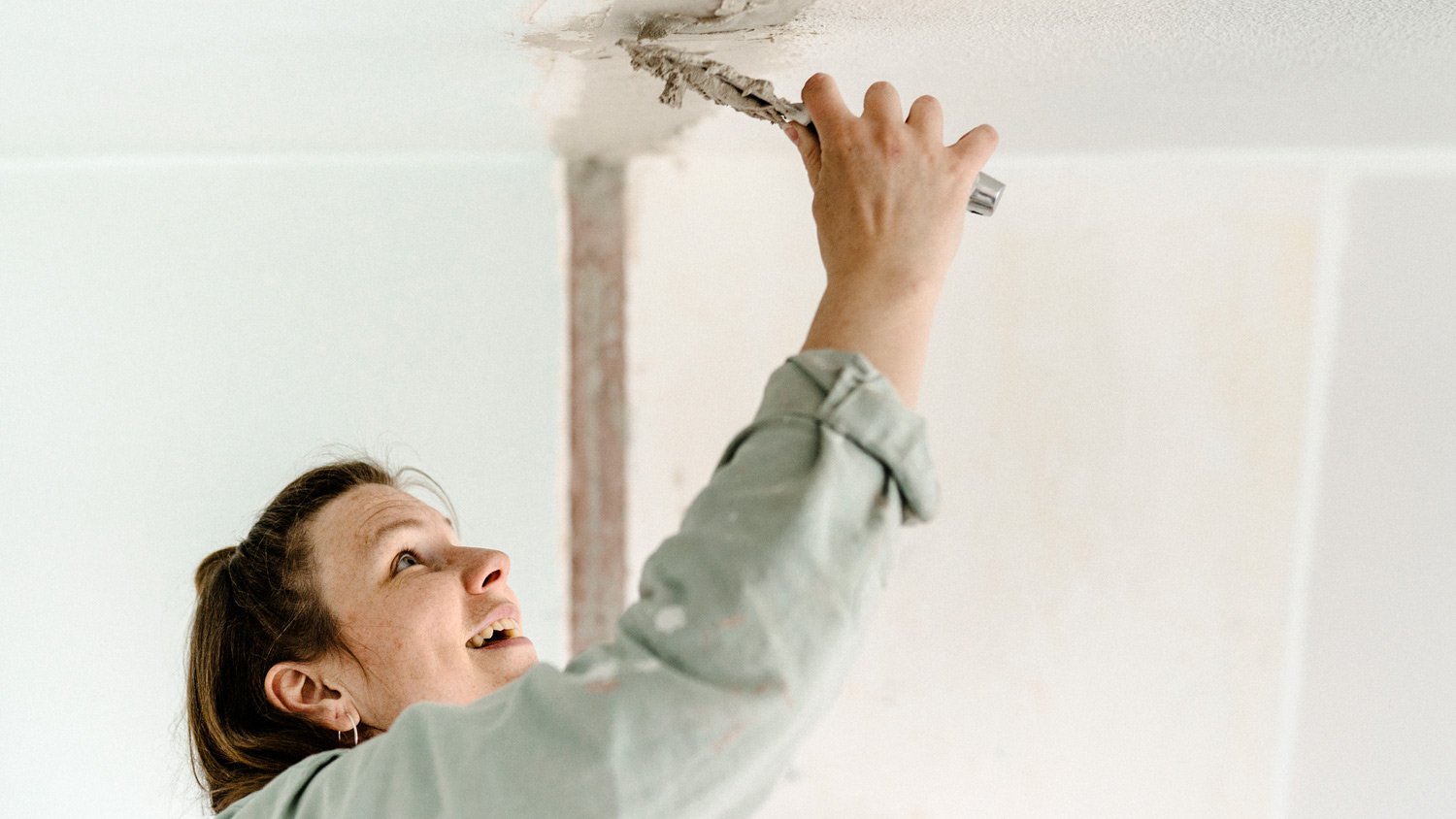
Plaster repair costs are determined by the size and type of damage. Discover why some fixes you can DIY and why some require a pro’s help.
Let’s scratch the surface of everyday ceiling noises


Some ceiling noises are normal due to shifting, settling, or expanding.
Loud, random ceiling noises like thuds or scratches may be due to a pest infestation.
If you don’t notice any repeat patterns in the sounds, it’s likely pests.
You can insulate your ceiling to better protect against noise.
Hearing noises in your ceiling is always a bit unsettling. Luckily, most of the time, they’re nothing to worry about and are simply the sounds of your home doing its job to protect you. But, there are some noises that you shouldn’t ignore as they can be an indicator of a much larger issue. Keep reading to find out whether what you’re hearing is just simply annoying or if it’s a warning bell.
Scratching could be due to a few things, some of which are normal and others that aren’t. If you’re surrounded by trees, it could just be the branches blowing in the breeze.
But if you’re hearing scratching on mild weather days or only during certain times of the day, you could have squirrels or raccoons. Squirrels are typically awake and active during the day, while raccoons are nocturnal and active at night.
The first thing to do is check for trees. If their branches are rubbing against your roof or house, trim the trees yourself or hire a tree trimming company. Left unchecked, the branches could end up damaging your shingles and become a bigger issue than simply just annoying you at night.
If you think it’s pests, hire a pest control company to come out and check for an infestation. If your attic is easy to navigate, you could check for signs of an infestation yourself (droppings, nestings, etc) first.
Loud thuds are almost always due to an infestation, typically larger pests like squirrels or raccoons. Not to be confused with tapping or knocking, a thud is loud and inconsistent (meaning it’s not three or so in a row, which is more common with sounds from your HVAC system).
Take a few days to make sure the sound doesn’t happen around the same time or after the same event, like when your AC unit turns off. Double check that it’s a loud thud, not a tap or knock. Once you know the thudding is random, it’s time to call pest control.
Cracking, creaking, and popping are common sounds you should expect your home to make. These ceiling noises are likely due to your roof or framing expanding and contracting throughout the day.
Typically, you’ll hear these sounds anytime the weather shifts, like at sunrise or sunset. So, even if you only seem to hear cracking noises in your ceiling at night, it’s probably not a cause for alarm and is simply your house settling for the night alongside the sun.
And during winter, these sounds may become more frequent or seemingly more random as ice and snow shift on your roof.
Typically, cracking and popping noises in walls or ceilings are no cause for alarm and don’t require any action. But, if you live in an older home where the sounds are more prevalent (and more annoying) you can soundproof your ceiling to help muffle the noise.
Tapping in the ceiling could be many things. If the tapping sounds are only at night, it could be some sort of pest. But, the tapping could also be due to something as simple as a ceiling fan or expanding ductwork.
Tapping is a complex sound to pinpoint, as it can easily be confused with popping or dripping. But if you’re sure it’s a tap, you could have termites or click beetles as they can make specific tapping sounds. If the tapping is also accompanied by scratching or thuds, mice could be the culprit.
Before you call a pro in, make sure the tapping isn’t something as simple as your ceiling fan making noise. If you suspect pests, call a pest control company immediately.
Rattling sounds are likely due to faulty installation, whether it’s loose roof fasteners, a wayward filter on your HVAC system, or noisy air vents. If you only notice the noise when it’s windy out, it’s likely the roof fasteners. If the sound only happens when the HVAC system is running, it could be something wonky within the ductwork or filters—although this is typically more of an annoyance than an actual cause for concern.
Try to pinpoint where the rattling is coming from. Check your air vents and light fixtures (especially ceiling fans) to see if they cause the noise. If so, simply tighten the screws with a screw driver.
Dripping sounds from your ceiling can be either completely innocuous or a sign of a much larger issue. It could simply be the sound from your pipes draining or expanding, like after a hot shower. Or, it could be a clog or a leak in your HVAC system.
Start to pay attention to when you hear the dripping. If you realize that you only hear it after using your plumbing system, then there’s no cause for alarm. But, if it’s consistent throughout the day (or only started after you turned your air conditioner on for the summer), it could be a clog or leak. If that’s the case, call a plumber.

While some of these sounds are common and no cause for alarm, a few should be taken very seriously, as they can be a sign of a pest infestation.
In addition to tapping, scratching, thudding, or scurrying sounds in our ceiling, there are a few other telltale signs to watch out for:
Ceiling damage: Visible damage to your door, ceiling, or even outside are signs that some pests have made themselves at home in your ceiling.
Sagging: The weight of the pests could end up damaging your ceiling’s structure, leading to sagging.
Droppings: You should never see pest droppings in your home, and once you do, you should take action immediately.
Nesting materials: If you find nesting materials like shredded cloth or paper in a forgotten corner of your home, you probably have mice.
If you notice one or more of these signs, you probably need to start the process of getting rid of animals in your attic.
Unless you suspect a pest infestation, there probably is no need to call in a pro when you hear noises in your ceiling. But if the noises are not caused by pests and are accompanied by cracks in the ceilings or walls, it’s time to hire a ceiling repair tech.
While the problem could be minor and require a small ceiling repair cost ($438 - $1,720 on average), it could also be a sign of a structural issue with your foundation or roof. The pro can help uncover the real reason why your ceiling is making noises and help create a plan to combat it.
It can be confusing to know who to call for ceiling repair, especially considering the issue may be more complex than you know, so start with a ceiling repair pro for your initial inspection and let them guide you on the next steps.
Excellent service from Denis Very polite guy as well inspected my house for free for minor repairs.
Professional and efficient AC repair AC repair from Green City Pros! Jimmy was courteous and had our AC running smoothly in no time. Thumbs up for the excellent service, guys !
quick and expert diagnosis and repair. fair price. great service and no headaches
Professional, courteous and great quality. Would hire the team again.
I would recommend Alex and his workers to anyone, they really work with you to make you happy. My apartment was in very bad condition for various reasons and needed plastering and stripping and Alex and his workers made everything look like new. Regardless of the number of times I asked Alex...
Doug did an outstanding job. We contacted him back in July (based on his reviews on Angie's List)-- because we needed some carpentry work done at our home in Westhampton Beach. He was on time (actually arrived early for our first meeting), reliable, a pleasure to deal with and most of all his...
I had hesitated to install a high velocity air central air conditioning system in my 1923 coop unit because the first company who gave me an estimate said that they may have to drop soffits and ruin my original crown moulding. My upstairs neighbor had a different company and ended up...
From average costs to expert advice, get all the answers you need to get your job done.

Plaster repair costs are determined by the size and type of damage. Discover why some fixes you can DIY and why some require a pro’s help.

A ceiling repair averages about $1,000, but multiple factors affect this number. Learn more about creating an accurate ceiling repair cost estimate with our tips.

The cost of plastering walls and ceilings depends on the room size and ceiling height. Our tips can help you estimate an accurate cost.

Seeing a crack in your ceiling can be unnerving, but it’s not always cause for concern. Here’s how to repair ceiling cracks (and when to call a pro instead).

While beautiful, cathedral ceilings are prone to ventilation problems. Here are four major warning signs that your ceiling has venting problems and who to call for help.

Know these major warning signs of ceiling collapse and stay proactive so you can intervene and repair before it is too late.